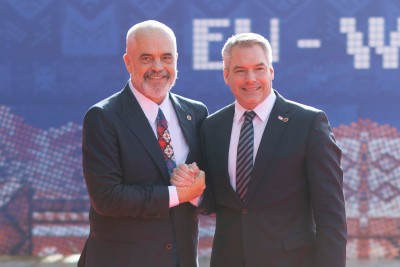Austria Still Declines the Schengen Expansion
Austrian Chancellor Karl Nehammer confirmed Austria’s negative position towards the Schengen expansion today. At the Western Balkan meeting today in the Albanian capital Tirana, Nehammer declined further Schengen expansions for now.
 Austrian Chancellor Karl Nehammer (r) met with Edi Rama (l) amongst others in Albania at the Western Balkans Summit. / Picture: © Bundeskanzleramt (BKA) / Andy Wenzel
Austrian Chancellor Karl Nehammer (r) met with Edi Rama (l) amongst others in Albania at the Western Balkans Summit. / Picture: © Bundeskanzleramt (BKA) / Andy Wenzel
In a statement on Tuesday, Austrian Chancellor Karl Nehammer called the EU Commission's action plan for the Balkan route an important first step. Austria's Nehammer stressed at the EU Western Balkans summit in Tirana that it was concerned not just with the Western Balkans route, but also with migration routes via Bulgaria, Romania, and Hungary. In his response, he reiterated his opposition to the expansion of Schengen to include Bulgaria and Romania, according to Der Standard. EU Commission President Ursula von der Leyen showed understanding for Austria, according to Die Presse.
According to ORF, Nehammer said Austria has to address migration security issues before expanding Schengen. Seventy-five thousand migrants are still unregistered in Austria. While Bulgaria is the "main gateway" to Europe, migrants would still enter from Romania. For his part, Romanian President Klaus Johannis expressed a desire to continue discussions with Austria. "We will discuss and negotiate until the last moment," he said, as stated by the ORF. The EU interior ministers are due to decide on the Schengen extension on Thursday.
There are still further demands from the Austrian side in terms of migration. Nehammer mentioned, for example, asylum procedures in safe third countries or a "rejection guideline" for people from countries who do not have the right to lead instead of individual assessments. "We still have a lot of things to talk about." Nehammer emphasized that the EU "recognizes that the Western Balkans are an important geostrategic partner when it comes to illegal migration", according to Die Presse.
The reduction of foreign influence, specifically from China and Russia, was also a subject at the meeting. The values of the EU must be respected and reforms must be implemented. In exchange for reforms, the EU intends to continue to provide generous financial support to the Western Balkan countries. An economic and investment offensive that has already been launched envisages providing up to nine billion euros in grants in the coming years. These should then mobilize an additional 20 billion euros in investments, according to ORF.
In the declaration, the states named support for European foreign and security policy, including sanctions against Russia, as a basic requirement for further rapprochement. This particularly addressed Serbia, which has so far not supported the EU's punitive measures because of the Russian war of aggression against Ukraine. In addition, Serbia and Kosovo were asked to settle their differences, as stated by the ORF.
In the end, a roaming agreement between the EU and the Western was signed. This agreement of intent provides for a reduction in roaming charges between the EU and the Western Balkans from October 1, 2023.



